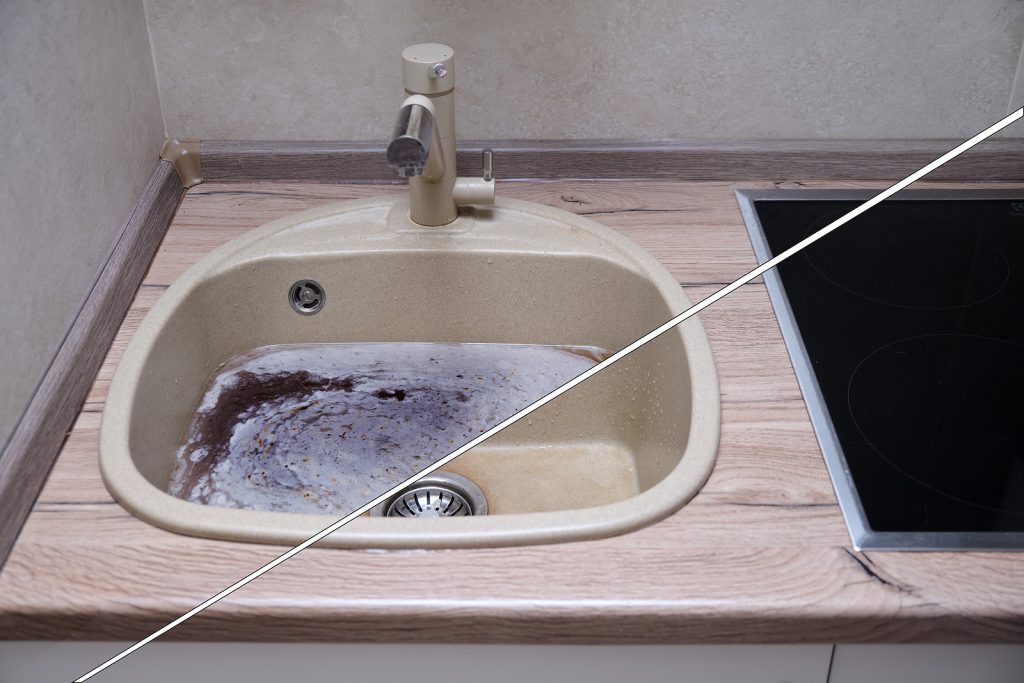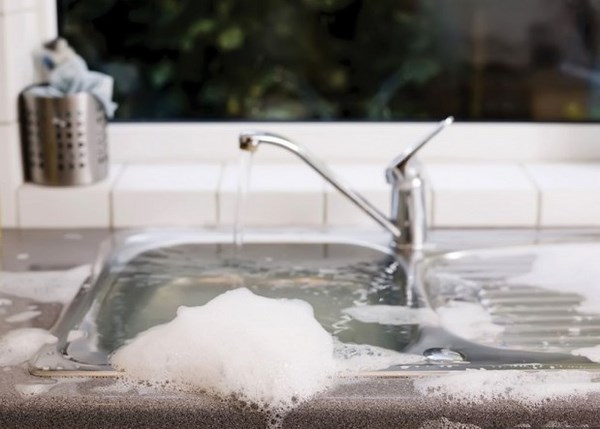The Big Blockage - 6 Causes Stalling Your Kitchen Sink's Ineffective Drainage
The Big Blockage - 6 Causes Stalling Your Kitchen Sink's Ineffective Drainage
Blog Article
Have you been in search of answers about What To Do When Your Kitchen Sink Won’t Drain?

It's not regular for your kitchen sink to block multiple times in one month. If your sink obstructs twice a week, there's some trouble taking place.
An obstructed kitchen drainpipe does not simply decrease your jobs, it deteriorates your whole plumbing system, little by little. Here are some usual practices that urge sink obstructions, as well as how to prevent them.
You need correct waste disposal
Reusing waste is fantastic, yet do you take note of your natural waste as well? Your cooking area ought to have two separate waste boxes; one for recyclable plastics and also one more for natural waste, which can end up being garden compost.
Having an assigned trash bag will aid you and your family prevent tossing pasta and also other food residues down the drain. Normally, these residues take in dampness and end up being obstructions.
Someone attempted to clean their hair in the kitchen sink
There's a right time as well as area for whatever. The cooking area sink is just not the appropriate place to wash your hair. Cleaning your hair in the kitchen area sink will certainly make it clog eventually unless you use a drain catcher.
While a drain catcher could catch the majority of the fallouts, some strands might still get through. If you have thick hair, this might suffice to slow down your water drainage and ultimately develop an obstruction.
You're throwing coffee down the tubes
Made use of coffee grounds as well as coffee beans still soak up a significant amount of dampness. They might seem little sufficient to throw down the drainpipe, yet as time goes on they start to swell and also take up more room.
Your coffee premises should go into natural garbage disposal. Whatever fraction leaves (possibly while you're depleting) will certainly be taken care of during your month-to-month cleaning.
You have actually been eating a lot of oily foods
Your cooking area sink might still obtain obstructed despite having organic waste disposal. This may be due to the fact that you have a diet regimen rich in greasy foods like cheeseburgers.
This grease layers the insides of pipes, making them narrower as well as more clog-prone.
Your pipe had not been repaired correctly to begin with
If you have actually been doing none of the above, yet still obtain regular clogs in your kitchen sink, you ought to call a plumber. There may be an issue with exactly how your pipelines were mounted.
While your plumber gets here, check for any leaks or irregularities around your kitchen area pipes. Don't try to take care of the pipelines on your own. This might cause an accident or a kitchen flood.
There's more dirt than your pipes can deal with
If you get fruits directly from a farm, you might notice even more cooking area dust than other individuals that shop from a mall. You can easily repair this by cleansing the fruits and also veggies effectively prior to bringing them right into your home.
Melt the sludge
The fault isn't from your kitchen sink at all
Possibly the issue isn't from your kitchen sink, but the whole water drainage system. In such a situation, you may see that sinks as well as drains pipes get clogged every other week. You require an expert plumbing service to repair this.
6 REASONS FOR A SLOW DRAINING BATHROOM SINK
Your bathroom sink is a regular part of your everyday routine. Every visit to the toilet follows with washing your hands. Every tooth brushing and flossing also happens over the sink, where you expect to clear away everything down the drain.
Unfortunately, you might encounter hiccups with your sink from time to time. A typical problem that many homeowners face is a slow draining bathroom sink. Sometimes, the water doesn’t seem to clear away quickly enough. Whatever you washed off will linger in the sink basin, leaving behind unsightly conditions in your bathroom.
If you notice a slow draining sink, it is time to mobilize. Whatever the problem might be, you don’t want to wait until it becomes a full-on clog that overpowers your plumbing system. You should bring in professional plumbers to inspect the bathroom pipes. In addition, have yearly maintenance and inspections to avoid costly repairs in the long run.
Slow draining sinks are more than an annoyance and can lead to the nightmare of a plugged-up pipe. Understanding why you have a draining problem is as important as fixing it. Once you understand the causes, you can be proactive to stop a blockage from building up. Here are the six reasons for a slow draining bathroom sink:
HAIR
Hair is a common cause of a slow draining bathroom sink. We all have lots of hair and spend much time grooming it. From brushing to shaving to washing, the hair leaves our bodies and makes its way down our drains. Unfortunately, it can get caught up during its journey down the pipes, restricting water flow. Hair also becomes a catch net for other debris.
Facial hair creates a similar problem for your bathroom sink. Shaving cream mixed with beard trimmings will form a thick gum that readily builds up in the sink drain. When dealing with hair in your sink, try to wipe it out of the bowl before rinsing. Use a paper towel to clean the basin so that the hair residue doesn’t get washed down the drain.
SOAP SCUM
Soap scum is another common culprit for a slow draining sink in the bathroom. Since we use soap to clean our hands and face, you’d think it should also wash the pipes below your sink. However, that is not the case at all. Soap scum loves to build upon the insides of plumbing pipes. Over time, the accumulation can grow into a significant problem for your household.
Soap scum starts as a film, but it will increase until you notice the water draining slower and slower. The soap is also very sticky, attracting other debris to join the blockage. Fortunately, hot water can address this problem and fix a slow draining sink. Get your kettle filled up and slowly pour the boiling water down the bathroom drain.
P-TRAP BLOCKAGE
Your p-trap is an area in the drainpipe under the sink where it forms a U shape. This component prevents sewer gas from coming up through the sink by allowing a water barrier to sit in the low spot. However, it might also collect debris that you wash down the bathroom sink.
If you notice your water draining more slowly, check the p-trap. There is a clean-out plug at the bottom of the trap, helping you to clear away minor problems. If there is a more significant blockage, contact a residential plumber for help. This expert can disconnect the entire p-trap pipe system, flushing it out with a hose. They will also put it back together and ensure your bathroom sink works properly again.
VENTING ISSUES
Your household’s plumbing system is a network of interconnecting pipes. The water lines in a bathroom sink connect with drain pipes and venting pipes. They all work in unison to ensure the water flows in and out. When you encounter a slow draining bathroom sink, there could be an issue with your venting.
Vents allow air to get drawn into the line, so you don’t create a vacuum that restricts the water flow. If your vent stack is clogged, it won’t allow the air to push the water. Check the stack on the roof to see if a bird has taken up residence there. Or maybe some other debris is plugging up the vents. Hire experts to clean out the vents, which might resolve the plumbing issue.
TREE ROOTS
The sink’s pipes travel through your home, where it connects outside to drain into your municipal system or a septic tank. Along the way, the pipes might get punctured by tree roots. If there are leaks in your underground pipes, trees may seek out the water source and grow into the space.
Tree roots are a slow-moving encroachment, so be wary of where they might interact with your pipes. The same caution goes to any shrubs you may plant nearby. Once the tree roots have invaded the pipes, you will need a plumber to solve the problem, which may end up being a significant repair.
SEWER LINE PROBLEMS
Besides tree roots plugging up your sewer lines, other blockages can happen. Your sewer line carries the wastewater out from your sink, toilets, and showers away from your home. These pipes can deteriorate over time, collapsing into the line and causing a blockage. Sludge may also accumulate, which slows down the drainage of water. Contact a professional plumber to inspect the situation thoroughly.
https://marcoplumbing.ca/blog/6-reasons-for-a-slow-draining-bathroom-sink/

We had been made aware of that write-up about Five Ways to Fix a Slow Sink Drain through an acquaintance on a different web address. Enjoyed our article? Please share it. Help other people discover it. I praise you for your time. Don't hesitate to pay a visit to our site back soon.
Show Details
Report this page